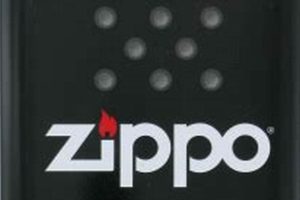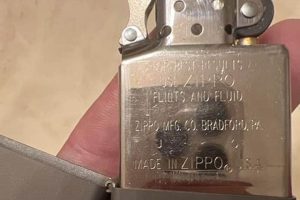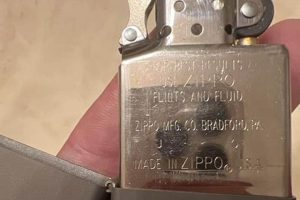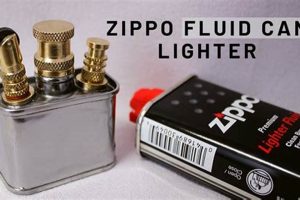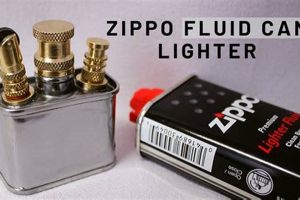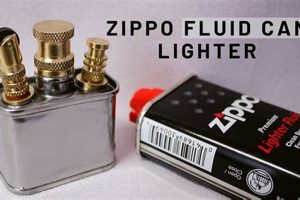Using charcoal lighter fluid in a Zippo-style lighter is strongly discouraged. These lighters are designed for a specific type of refined petroleum distillate, commonly referred to as lighter fluid. Charcoal lighter fluid, typically a mixture of hydrocarbons, burns at a higher temperature and produces more soot, which can clog the wick and internal mechanisms of a Zippo lighter, leading to malfunctions and potentially damaging the lighter. Furthermore, the different chemical composition can produce undesirable odors and potentially create a safety hazard.
The correct type of lighter fluid is essential for the proper function and longevity of a Zippo lighter. Using the recommended fuel ensures a clean burn, consistent flame, and minimizes the risk of damage. Zippo’s long history of reliability is partly due to the use of specifically formulated fuel. Choosing the correct fuel contributes to the lighter’s classic status as a durable and dependable tool.
This discussion highlights the importance of selecting appropriate fuels for specific devices. The following sections will delve into the characteristics of different types of lighter fluids, the mechanics of Zippo lighters, and recommended maintenance practices for optimal performance and safety.
Tips for Proper Zippo Lighter Fuel Usage
Maintaining a Zippo lighter’s functionality and longevity depends heavily on using the correct fuel. These tips offer guidance on fuel selection and related practices.
Tip 1: Use Only Zippo Premium Lighter Fluid. Specifically designed for these lighters, this fluid ensures optimal performance and minimizes potential damage. Alternatives, such as charcoal lighter fluid, can clog the wick and damage internal components.
Tip 2: Avoid Generic Lighter Fluids. While seemingly similar, generic lighter fluids may contain impurities or additives that can negatively impact the lighter’s performance and lifespan.
Tip 3: Fill the Lighter Correctly. Overfilling can lead to leaks and fuel evaporation. The lighter should be filled to capacity, but not overflowing.
Tip 4: Store Lighter Fluid Safely. Store fuel in a cool, dry place away from open flames and out of reach of children. Proper storage prevents evaporation and reduces fire hazards.
Tip 5: Regularly Clean the Lighter. Periodic cleaning, including the wick and chimney, helps prevent clogs and ensures consistent performance.
Tip 6: Replace the Wick When Necessary. A worn or charred wick can affect the flame quality. Replacements are readily available and easy to install.
Tip 7: Address Leaks Promptly. If a leak is detected, discontinue use and address the issue immediately to prevent fuel spills and potential fire hazards. Consulting manufacturer guidelines or authorized repair services is recommended.
Adhering to these guidelines ensures optimal lighter performance, extends its lifespan, and promotes safe operation.
By understanding the importance of correct fuel usage and implementing these practices, users can enjoy the reliable performance and extended lifespan that Zippo lighters are known for.
1. Fuel type incompatibility
Fuel type incompatibility is a central concern when considering the use of grill lighter fluid in a Zippo lighter. The specific design and functionality of Zippo lighters necessitate a particular type of fuel for optimal performance and safe operation. Using an incompatible fuel, such as grill lighter fluid, can lead to a range of issues, from diminished performance to potential hazards.
- Chemical Composition Discrepancy
Zippo premium lighter fluid consists of refined petroleum distillates formulated for a clean, consistent burn. Grill lighter fluid, conversely, often contains heavier hydrocarbons and additives designed for igniting charcoal. These differing chemical compositions result in distinct burning characteristics. Grill lighter fluid’s higher combustion temperature and increased soot production are unsuitable for the intricate mechanism of a Zippo lighter.
- Wick Clogging and Residue Buildup
The heavier components and additives in grill lighter fluid significantly increase the risk of wick clogging. Residue buildup within the lighter’s internal mechanisms can hinder fuel flow and disrupt the spark wheel’s operation. This can lead to inconsistent flames, difficulty igniting, and potentially permanent damage to the lighter.
- Compromised Performance and Lifespan
Using an incompatible fuel like grill lighter fluid compromises the lighter’s intended performance. Reduced fuel efficiency, inconsistent flame height, and increased maintenance requirements are common consequences. Over time, the buildup of residue and damage to internal components can significantly shorten the lifespan of the lighter.
- Potential Safety Hazards
The improper combustion of grill lighter fluid within a Zippo lighter can pose safety hazards. Increased soot production elevates the risk of uncontrolled flames and potential burns. Additionally, using an unsuitable fuel can damage the lighter’s casing, creating leaks and increasing the risk of accidental ignition of spilled fuel.
Therefore, fuel type incompatibility directly impacts the functionality, lifespan, and safety of a Zippo lighter. Using the recommended fuel is essential for maintaining optimal performance and preventing potentially hazardous situations. Opting for a fuel specifically designed for the lighter ensures its intended operation and longevity, while minimizing risks associated with incompatible fuels.
2. Clogging Risk
Clogging risk represents a significant concern when considering the use of grill lighter fluid in a Zippo lighter. The lighter’s intricate mechanism, designed for a specific type of fuel, is susceptible to clogging from the heavier composition and additives often found in grill lighter fluid. This can lead to performance issues and potentially permanent damage. Understanding the specific components affected and the resulting consequences is crucial for proper lighter maintenance and safe operation.
- Wick Clogging
The wick, a crucial component for fuel delivery and combustion, is particularly vulnerable to clogging. Grill lighter fluid’s heavier hydrocarbons and additives can leave residue on the wick, restricting fuel flow and hindering proper ignition. This can manifest as a weak or inconsistent flame, requiring frequent cleaning or even wick replacement.
- Rayon Ball Saturation
Inside the fuel chamber, rayon balls hold the lighter fluid. These balls can become saturated with the heavier components of grill lighter fluid, impeding their ability to absorb and release fuel effectively. This can result in inconsistent fuel delivery and difficulty igniting the lighter.
- Flint Tube Obstruction
The flint tube, responsible for creating the spark that ignites the fuel, can also become obstructed by residue from grill lighter fluid. This can interfere with the sparking mechanism, leading to ignition failures and requiring disassembly for cleaning.
- Hinge and Lid Contamination
Residue from grill lighter fluid can accumulate on the hinge and lid of the lighter, affecting its smooth opening and closing. Over time, this buildup can also contribute to corrosion and damage the lighter’s finish.
The cumulative effect of these clogging risks significantly impacts the functionality and lifespan of a Zippo lighter. Using grill lighter fluid increases the likelihood of malfunctions, necessitates more frequent cleaning and maintenance, and potentially leads to irreparable damage. Therefore, adhering to the manufacturer’s recommendation of using only Zippo premium lighter fluid is essential for ensuring optimal performance and longevity.
3. Damage potential
Damage potential is a critical consideration regarding the use of grill lighter fluid in a Zippo lighter. Using an incompatible fuel like grill lighter fluid can lead to various issues, impacting the lighter’s functionality, aesthetics, and lifespan. The damage can range from minor inconveniences to significant malfunctions requiring professional repair or even rendering the lighter unusable.
One primary concern is the impact on the wick. Grill lighter fluid’s heavier composition and higher burning temperature can char and degrade the wick more rapidly than the recommended lighter fluid. This leads to a shorter wick lifespan, requiring more frequent replacements. Additionally, the increased soot production can clog the wick, hindering fuel flow and resulting in a weaker, inconsistent flame.
Beyond the wick, the internal mechanisms of the lighter are also susceptible to damage. The flint wheel, essential for generating the spark, can become gummed up with residue from the improper fuel. This can impede its rotation and make it difficult to ignite the lighter. Furthermore, the fuel chamber itself can suffer from corrosion due to the chemical composition of grill lighter fluid. This can lead to leaks, compromising both the lighter’s functionality and safety.
The damage extends to the lighter’s exterior as well. The increased soot production from grill lighter fluid can stain the lighter’s finish, diminishing its aesthetic appeal. Furthermore, leaks caused by internal corrosion can further damage the finish and potentially stain clothing or other surfaces.
In summary, the damage potential associated with using grill lighter fluid in a Zippo lighter is significant. The risks extend to all aspects of the lighter, from the wick and internal mechanisms to the external finish. Using the recommended lighter fluid mitigates these risks and ensures the lighter’s longevity and optimal performance. Understanding the potential for damage underscores the importance of using the correct fuel and adhering to proper maintenance practices.
4. Safety Hazards
Utilizing grill lighter fluid in a Zippo-style lighter presents several safety hazards. The incompatibility between the fluid and the lighter’s design creates risks ranging from minor burns to significant fire hazards. Grill lighter fluid, formulated for igniting charcoal, possesses different chemical properties and a higher flash point than Zippo premium lighter fluid. This difference in flash pointthe lowest temperature at which a liquid can form an ignitable mixture in airincreases the risk of unintended ignition during filling and operation.
The higher burn temperature of grill lighter fluid can cause the lighter’s metal casing to overheat, potentially leading to burns for the user. Furthermore, the increased production of soot associated with grill lighter fluid can clog the lighter’s wick and internal mechanisms. This blockage can create unpredictable flames and increase the risk of uncontrolled fires. A real-world example of this hazard is a lighter malfunctioning and igniting nearby flammable materials due to an excessively large flame caused by improper fuel. Another potential hazard arises from the increased likelihood of leaks. Grill lighter fluid can degrade the seals within the lighter, leading to fuel leakage. Leaked fuel can ignite unexpectedly, posing a fire hazard and potentially causing burns.
Understanding the inherent safety hazards associated with using grill lighter fluid in a Zippo lighter is crucial for responsible operation. Choosing the correct fuel specifically designed for the lighter significantly reduces these risks. Adhering to manufacturer recommendations and employing safe handling practices mitigates potential dangers and ensures safe and proper lighter functionality. Ignoring these precautions can lead to accidents with potentially severe consequences, underscoring the importance of proper fuel selection and usage.
5. Performance issues
Performance issues directly correlate with the use of grill lighter fluid in a Zippo-style lighter. The incompatibility stems from the fluid’s chemical composition and its impact on the lighter’s delicate mechanism. Grill lighter fluid, designed for high-temperature burning in charcoal grills, contains heavier hydrocarbons and additives unsuitable for the precision engineering of a Zippo lighter. These heavier components tend to clog the wick, restricting fuel flow and leading to inconsistent flames. The residue also builds up within the lighter’s internal mechanisms, hindering the smooth operation of the spark wheel and potentially leading to ignition failures. One practical consequence is the lighter failing to ignite reliably, especially in adverse weather conditions. Another frequent issue is a weak, sputtering flame that struggles to stay lit, rendering the lighter ineffective for its intended purpose.
Consider a scenario where a user attempts to light a campfire in windy conditions using a Zippo filled with grill lighter fluid. The clogged wick and restricted fuel flow will likely prevent the lighter from producing a consistent flame, making it difficult or impossible to ignite the kindling. Alternatively, imagine using the lighter for everyday tasks, such as lighting a candle or a cigarette. The inconsistent flame and potential for sputtering can create inconvenience and even pose a minor safety risk. These practical examples illustrate how using an unsuitable fuel directly impacts the lighter’s performance and reliability.
Understanding the link between fuel type and performance is crucial for maintaining a Zippo lighter’s functionality. While seemingly a minor detail, fuel selection significantly impacts the user experience. Using the correct fuel, specifically Zippo premium lighter fluid, ensures consistent performance and prevents potentially frustrating or even hazardous situations. The practical significance of this understanding lies in maintaining the lighter’s reliability, extending its lifespan, and ensuring safe operation. Choosing the correct fuel avoids unnecessary maintenance, repairs, or even replacement of the lighter due to preventable damage.
6. Voiding Warranty
Warranty coverage for Zippo lighters hinges significantly on proper usage, including the exclusive use of Zippo premium lighter fluid. Using alternative fuels, such as grill lighter fluid, can void the warranty, leaving the owner responsible for repair or replacement costs. This connection between fuel type and warranty validity necessitates careful consideration of the implications of using inappropriate fuels.
- Unapproved Fuel Usage
Zippo’s warranty explicitly covers defects in materials and workmanship under normal use. Using grill lighter fluid deviates from “normal use” as defined by the manufacturer. This unauthorized fuel use constitutes grounds for warranty invalidation. For example, if the lighter malfunctions due to clogging caused by grill lighter fluid, any repair or replacement costs become the owner’s responsibility.
- Damage Caused by Incompatible Fuels
Grill lighter fluid can damage internal components due to its different chemical properties and higher burning temperature. Damage resulting from such incompatible fuels is typically excluded from warranty coverage. A damaged wick, clogged fuel chamber, or malfunctioning spark wheel resulting from grill lighter fluid usage would not qualify for warranty repair.
- Evidence of Misuse
Repair technicians can often identify misuse based on residue or damage patterns within the lighter. Evidence of grill lighter fluid usage can serve as grounds for denying a warranty claim. Even if the apparent malfunction seems unrelated to the fuel type, the presence of improper fuel residue can invalidate the warranty.
- Loss of Consumer Protection
Voiding the warranty negates the consumer protections offered by the manufacturer. This leaves the owner vulnerable to bearing the full cost of repairs or replacement, potentially exceeding the cost of using the correct fuel in the first place. Losing warranty coverage ultimately diminishes the long-term value and reliability associated with Zippo lighters.
The implications of voiding the warranty by using grill lighter fluid underscore the importance of adhering to the manufacturer’s recommendations. While seemingly a minor detail, fuel selection directly impacts the long-term cost and reliability of the lighter. Using the correct fuel preserves the warranty, ensuring continued manufacturer support and protecting the investment in a quality product. Ultimately, understanding the link between fuel choice and warranty validity contributes to a more informed and cost-effective ownership experience.
Frequently Asked Questions
This section addresses common inquiries regarding proper fuel usage in Zippo lighters, focusing on the implications of using alternative fuels.
Question 1: What type of fuel is recommended for Zippo lighters?
Zippo premium lighter fluid is explicitly recommended for optimal performance and longevity. This specialized fluid is formulated to minimize clogging and ensure consistent ignition.
Question 2: Can lighter fluids designed for other purposes, such as grill lighters, be used in a Zippo lighter?
No. Using alternative fuels, including grill lighter fluid, is strongly discouraged. These fuels often contain different chemical components and additives that can damage the lighter’s internal mechanisms, clog the wick, and create safety hazards.
Question 3: What are the potential consequences of using grill lighter fluid in a Zippo lighter?
Consequences can include reduced performance, inconsistent flames, increased soot production, clogging of the wick and internal components, potential damage to the lighter’s casing, and invalidation of the warranty.
Question 4: Will using grill lighter fluid void the Zippo warranty?
Yes. Using any fuel other than Zippo premium lighter fluid can void the warranty. Evidence of improper fuel usage can be detected during inspection, negating coverage for repairs or replacement.
Question 5: Are there any safety concerns associated with using grill lighter fluid in a Zippo?
Yes. Grill lighter fluid burns at a higher temperature and produces more soot than Zippo premium lighter fluid. This can lead to overheating of the lighter’s casing, unpredictable flames, and increased fire hazards.
Question 6: Where can authentic Zippo premium lighter fluid be purchased?
Authentic Zippo premium lighter fluid can be purchased from authorized retailers, including tobacco shops, convenience stores, and online marketplaces. Ensuring authenticity is crucial for optimal performance and warranty validity.
Using the correct fuel is paramount for maintaining a Zippo lighter’s functionality, longevity, and safety. Adhering to manufacturer recommendations ensures optimal performance and avoids potential hazards.
For further information regarding Zippo lighter maintenance and troubleshooting, consult the official Zippo website or contact authorized service centers.
Can You Use Grill Lighter Fluid in a Zippo? A Definitive Answer.
Exploration of the query “can you use grill lighter fluid in a Zippo” reveals a definitive negative. Using grill lighter fluid in a Zippo lighter is demonstrably detrimental, impacting functionality, longevity, and safety. Key points include fuel incompatibility, increased clogging risk, potential for component damage, heightened safety hazards, diminished performance, and warranty invalidation. The lighter’s intricate design necessitates a specific fuel type, Zippo premium lighter fluid, for optimal operation. Deviation from this recommendation introduces significant risks and compromises the lighter’s intended performance characteristics.
Maintaining a Zippo lighter’s reliability and longevity requires adherence to manufacturer guidelines. Utilizing the correct fuel is paramount for safe and effective operation. Disregarding these recommendations not only jeopardizes the lighter’s functionality but also introduces potential safety hazards. Proper fuel selection ensures optimal performance and preserves the lighter’s intended lifespan, underscoring the significance of informed decision-making in lighter maintenance.


